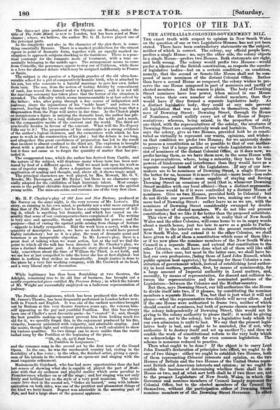The Postilion de Lotijumeau, which has been produced this week
at the St.. James's Theatre, has been frequently performed in London before now, both in French and English. It was one of the earliest novelties brought out by Brabam at this very theatre fourteen years ago, the veteran him- self appearing as the gay and youthful Postilion. But this has always been one of Chollet's most favourite parts—he "created" it; and, though the best possible making-up cannot prevent him from looking much too old for it, we speedily forget this, in the enjoyment produced by his fire, vivacity, humour untainted with vulgarity, and admirable singing. And the music, though light and without pretension, is well calculated to show his various qualities. No two things can be more unlike than the rustic ballad sung by the Postilion at the beginning of the piece,
" Oh, oh, oh, qu'il gtait beau, Le Postilion de Lonjumeau!"
-and the romance sung in the second act by the first tenor of the Grand Opera. In the one, he was the uneducated country lad, rioting in the flexibility of a fine voice ; in the other, the finished artist, giving a speci- men Of his talents in the rehearsal of an opera-air and singing with the most exquisite refinement.
Madenloiselle Guichard, who has had more opportunities than she had last season of showing what she is capable of, played the part of Made- leine with that sly archness and playful malice which seem peculiar to Frenchwomen whether on or off the stage ; and her singing was not only lively and brilliant but in the style of a very good musician. The serio- comic love duet in the second act, "Grace au hazard," sung with infinite animation on both sides, was one of the prettiest and pleasantest things of the kind we have heard. Buguet was admirable in the amusing part of NH, and had a large share of the general applause.


























 Previous page
Previous page